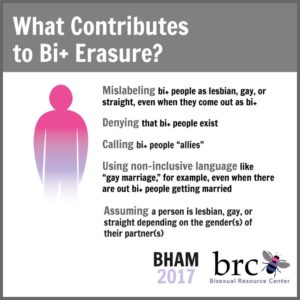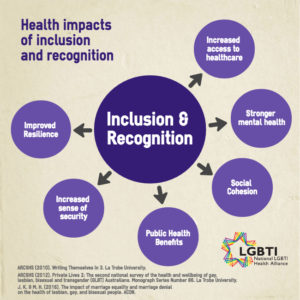All across the country, LGBTQ individuals find themselves subject to both laws and social stigmas that undermine their mental and physical health. Ellen Riggle, PhD, and Sharon Rotosky, PhD, have described this as the “impact of sexual-minority status.” As they explain, living in a “culture of devaluation, including overt and subtle prejudice and discrimination, creates and reinforces the chronic, everyday stress that interferes with optimal human development and well-being.”
This culture of devaluation has a unique impact on bisexual+, pansexual, fluid, queer, etc, identified people. Bi+ people make up the majority of the LGBTQ community, but receive less than 1% of all funding that supports LGBTQ advocacy, and they experience significantly higher rates of physical, sexual, social, and emotional violence and disparities than gay and straight people, as well as poorer physical, mental, and social health. To combat this, the Bisexual Resource Center, America’s oldest bisexual national organization, created #BiHealthMonth to raise awareness about the bi+ community’s economic, social and health disparities.
Bi+ sexuality is often delegitimized by negative stereotypes, erasure, and biphobia — even from within the LGBTQ community. This lack of validation and acceptance strongly contributes to what William C. Buffie, MD calls “minority stress” and all of the negative mental and physical consequences that come with it. Bi+ people experience a unique form of minority stress, in that their sexual orientation isn’t always visible to others.
In addition to overt discrimination and erasure, bi+ individuals are constantly subject to subtle, inadvertent, or insensitive attacks on the core of their identity. It’s important to connect with bisexual-specific and -inclusive resources, programs, and services that can best serve bi+ people’s mental health needs.
Belle Haggett Silverman, President of the Bisexual Resource Center, underscores the importance of bi+ representation and visibility in combating health disparities and toxic stress:
“Bisexual+ representation is better every day, but bisexual+ people continue to face alarmingly high barriers to living happy, healthy lives. Whether on stage at the Oscars, in the classroom, in political office, or at the doctor’s office, bisexual+ representation (or lack thereof) impacts our day-to-day well-being and shapes our culture. #BiHealthMonth unites supporters across expertise and identities to celebrate achievements and find solutions that empower our community.”
Family Equality Council is proud to celebrate Bisexual+ Health Awareness Month!
For more resources, go to: bihealthmonth.org/


